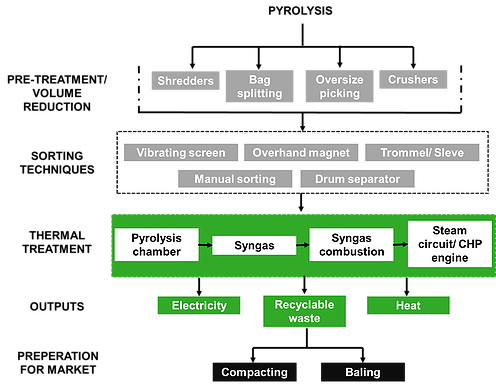Pyrolysis is a thermal degradation of a substance at high temperatures in the absence of oxygen.
It involves the simultaneous change of chemical composition and physical phase , and is irreversible and requires a relatively consistent waste stream.

Configuration
Technology restrictions
- Pyrolysis technology is capital intensive
- Pyrolysis is energy intensive which reduces the gross energy output of plant significantly
- Metal and inert material require separation before thermal treatment if they are intended for removal
Main license requirements for pyrolysis
Advantages:
- May be used for all types of solid products
- Can be easily adapted to changes in feedstock composition
- Can be integrated into micro turbine, fuel cell or thermophotovoltaic (TPV) systems for power generation
Disadvantages:
- High capital costs
- Qualified and experienced personnel needed to operate machinery
Cynar Plastics to Diesel
Cynar Plc. ("Cynar") is a UK company established to commercialise its specialised pyrolysis and distillation technology to convert non-recyclable waste plastics into liquid hydrocarbon fuels.Cynar has been developing its pyrolysis technology since 2004 and installed its first full scale plant in County Laois, Ireland in 2008. In 2011, SITA UK, one of the country‟s leading recycling and resource management companies and a subsidiary of French firm Suez Environment, signed an exclusive agreement with Cynar to build the UK‟s first fully operational plants to convert “end of life plastic” (ELP) into diesel fuel in a contract valued at £70m. SITA is planning to construct up to 10 plants, each with an annual throughput of 6,000 tonnes of plastic waste, producing approximately 5.7 million litres of synthetic fuel.The first facility is currently being constructed in SITA‟s Avonmouth Resource Recovery Park, which will also include a gasification facility capable of treating 100,000 tonnes per annum (tpa) of residual waste and an 80,000 tpa materials recycling facility (MRF). The Cynar Technology produces a synthetic fuel that is clean, low in sulphur and has a higher cetane number than generic diesel fuel. SITA UK‟s agreement with Cynar will help the UK as it attempts to deal with mixed waste plastic with a solution that is both environmentally efficient and energy productive.
